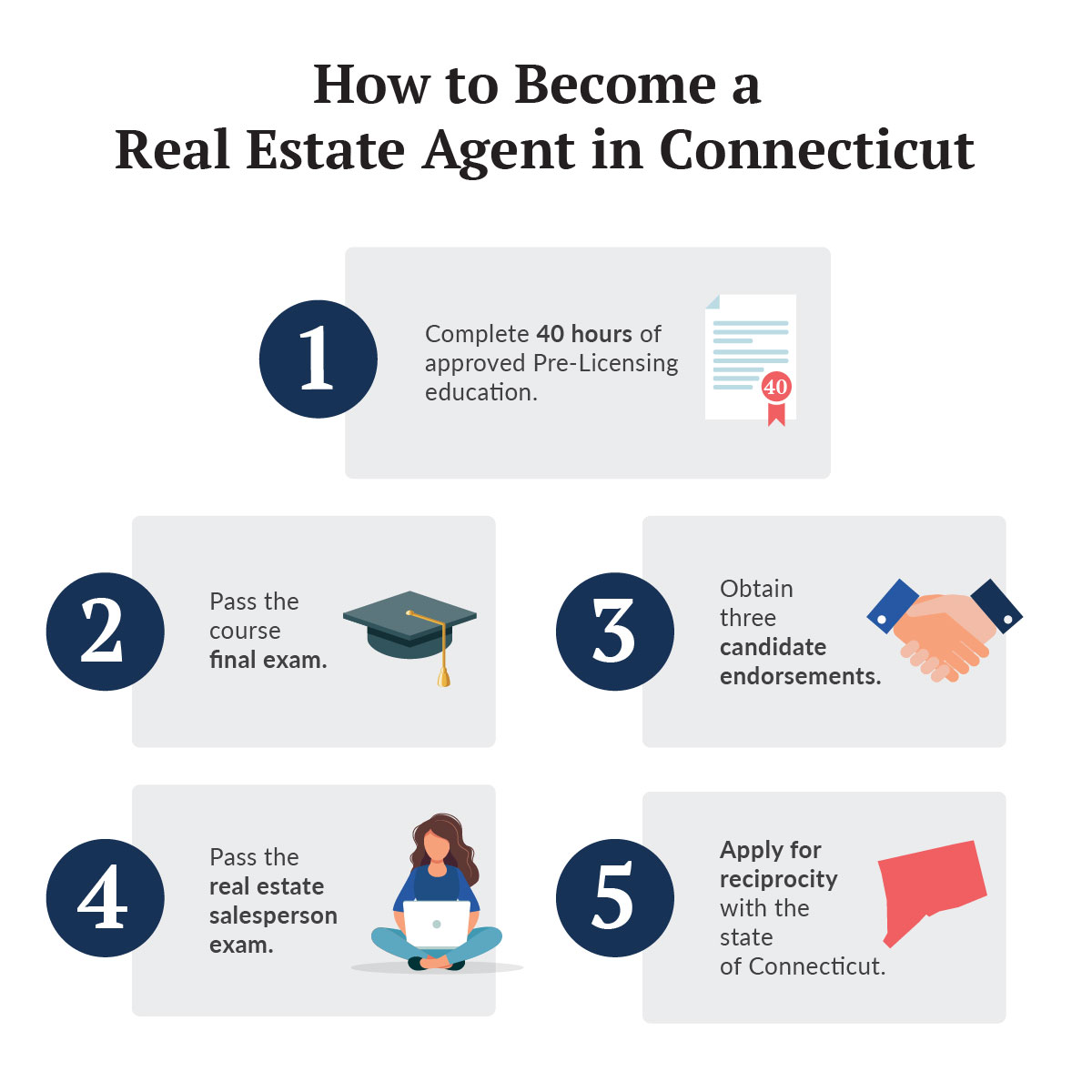How To Become A Real Estate Agent In Connecticut: A Comprehensive Guide
Embarking on a career as a real estate agent in Connecticut can be an exciting and lucrative journey. The state's vibrant housing market offers numerous opportunities for aspiring agents. Whether you're a local or planning to relocate, this guide will walk you through the essential steps to launch your career in the real estate industry.
Connecticut's real estate market is known for its diversity, ranging from charming suburban homes to luxurious waterfront properties. Aspiring agents need to equip themselves with the right knowledge and skills to navigate this dynamic market successfully.
This article will provide a step-by-step guide on how to become a real estate agent in Connecticut, covering everything from education requirements to licensing and beyond. Let's dive in!
Read also:Unveiling The Mystique Of Alina Angel A Rising Star In The Spotlight
Table of Contents
- Education Requirements for Real Estate Agents
- How to Obtain a Real Estate License in Connecticut
- Pre-Licensing Course Details
- Passing the Real Estate Exam
- Choosing a Real Estate Broker
- Building Your Real Estate Marketing Strategy
- Tips for Success as a New Agent
- Understanding the Costs Involved
- Growing Your Real Estate Business
- Additional Resources for Real Estate Agents
Education Requirements for Real Estate Agents
Before you can start selling properties, you need to meet the education requirements set by the State of Connecticut. The state mandates that all aspiring real estate agents complete a pre-licensing education course.
The pre-licensing course covers a wide range of topics, including real estate law, property management, and contract negotiations. This foundational knowledge is crucial for understanding the intricacies of the real estate industry.
Key Topics Covered in Pre-Licensing Courses
- Real estate principles and practices
- Property law and regulations
- Market analysis and valuation
- Ethics and professional conduct
Completing this course not only prepares you for the licensing exam but also equips you with the necessary skills to excel in your career.
How to Obtain a Real Estate License in Connecticut
Once you've completed the pre-licensing course, the next step is to apply for your real estate license. The process involves several steps, including submitting an application and passing the licensing exam.
The Connecticut Department of Consumer Protection oversees the licensing process and ensures that all candidates meet the necessary requirements.
Steps to Obtain Your License
- Submit your application along with the required fees
- Pass the state-administered real estate exam
- Receive your license upon successful completion
Having a valid license is essential for legally practicing as a real estate agent in Connecticut.
Read also:Cassper Nyovest Marks 1 Year Of Marriage With Pulane Mojaki With Moving Love Letter
Pre-Licensing Course Details
The pre-licensing course is a critical component of becoming a real estate agent in Connecticut. It consists of 90 credit hours of instruction and is designed to provide a comprehensive understanding of the industry.
These courses are offered by various accredited institutions and can be completed either in-person or online, offering flexibility for aspiring agents.
What to Expect from the Course
- Interactive learning modules
- Case studies and practical exercises
- Expert instructors with industry experience
Choosing the right course provider is important for ensuring that you receive quality education and preparation for the licensing exam.
Passing the Real Estate Exam
The real estate exam is the final hurdle in obtaining your license. It consists of two sections: a national portion and a state-specific portion. Both sections test your knowledge of real estate principles and Connecticut-specific regulations.
It's essential to prepare thoroughly for the exam by reviewing course materials and taking practice tests. Many candidates find that additional study resources, such as flashcards and online quizzes, are beneficial.
Tips for Exam Preparation
- Create a study schedule and stick to it
- Utilize practice exams to identify weak areas
- Join study groups for collaborative learning
With dedication and preparation, you can successfully pass the exam and take the next step toward becoming a licensed agent.
Choosing a Real Estate Broker
After obtaining your license, you'll need to affiliate with a licensed real estate broker to begin practicing. Choosing the right broker is a crucial decision that can impact your career trajectory.
When evaluating potential brokers, consider factors such as commission structures, training programs, and support services. A reputable broker can provide valuable mentorship and resources to help you succeed.
Key Considerations When Selecting a Broker
- Broker reputation and market presence
- Training and development opportunities
- Technology and marketing support
Building a strong relationship with your broker can enhance your professional growth and success in the industry.
Building Your Real Estate Marketing Strategy
Marketing is a vital aspect of a real estate agent's career. Developing an effective marketing strategy is essential for attracting clients and building a successful business.
In today's digital age, leveraging online platforms and social media can significantly boost your visibility. Additionally, networking and community involvement can help establish you as a trusted professional in the industry.
Essential Marketing Tactics for Real Estate Agents
- Create a professional website and online presence
- Utilize social media platforms for client engagement
- Host open houses and community events
Investing time and effort into your marketing efforts can yield significant returns and help you stand out in a competitive market.
Tips for Success as a New Agent
Starting a career as a real estate agent can be challenging, but with the right mindset and strategies, you can achieve success. Here are some tips to help you thrive in your new role:
Top Tips for New Real Estate Agents
- Build strong relationships with clients and colleagues
- Continuously educate yourself on market trends and regulations
- Set clear goals and develop a business plan
By focusing on these key areas, you can establish a solid foundation for long-term success in the real estate industry.
Understanding the Costs Involved
Becoming a real estate agent involves several costs, from education and licensing fees to marketing expenses. It's important to understand these costs upfront to budget accordingly.
The total cost can vary depending on factors such as course provider and broker affiliation. On average, aspiring agents can expect to spend between $1,000 and $2,000 on initial expenses.
Common Costs for Aspiring Real Estate Agents
- Pre-licensing course tuition
- Licensing exam fees
- Marketing and business setup expenses
While there are upfront costs, the potential for financial reward in the real estate industry makes it a worthwhile investment.
Growing Your Real Estate Business
Once you've established yourself as a real estate agent, the next step is to focus on growing your business. Expanding your client base, enhancing your skills, and exploring new opportunities are key to long-term success.
Continuing education and professional development are also important for staying ahead in the industry. Pursuing advanced certifications and attending industry events can provide valuable insights and networking opportunities.
Strategies for Business Growth
- Expand your service offerings to include commercial properties
- Invest in advanced technology and tools
- Form strategic partnerships with other professionals
By implementing these growth strategies, you can elevate your real estate career and achieve your professional goals.
Additional Resources for Real Estate Agents
There are numerous resources available to support real estate agents in their careers. From industry associations to online forums, these resources can provide valuable information and networking opportunities.
The Connecticut Association of Realtors (CAR) is an excellent resource for agents, offering educational programs, advocacy, and networking events. Additionally, online platforms such as Realtor.com and Zillow can help agents expand their reach and connect with potential clients.
Valuable Resources for Real Estate Agents
- Connecticut Association of Realtors (CAR)
- National Association of Realtors (NAR)
- Local real estate networking groups
Taking advantage of these resources can enhance your knowledge and expand your professional network, ultimately contributing to your success in the real estate industry.
Conclusion
Becoming a real estate agent in Connecticut requires dedication, education, and a strategic approach. By following the steps outlined in this guide, you can successfully navigate the process and launch a rewarding career in the real estate industry.
We encourage you to take action by starting your education, preparing for the exam, and building your marketing strategy. Don't hesitate to reach out to us for further guidance or to share your experiences in the comments below. Remember, success in real estate is within your reach with the right mindset and effort.
For more insights and tips, explore our other articles on real estate and related topics. Thank you for reading, and best of luck on your journey to becoming a real estate agent in Connecticut!


